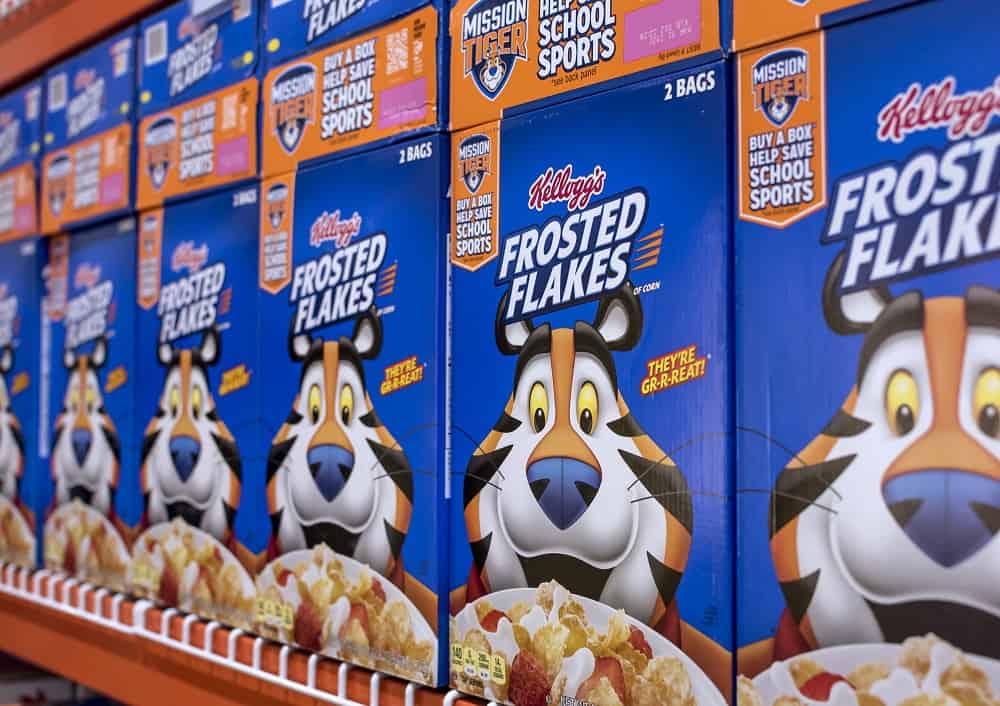First introduced in the US in 1952, Frosted Flakes (AKA Frosties) are a highly popular cereal brand that is essentially sugar-coated corn flakes. Represented by the mascot Tony the Tiger, Frosted Flakes lists as the second most favorite cereal in a survey conducted with over a thousand respondents (1).
Kellogg’s Frosted Flakes are relatively simple in terms of ingredients compared to most other breakfast cereal brands. Additionally, most of the ingredients used are totally vegan. The only ingredient that is potentially problematic is sugar as it remains a gray area ingredient. However, the biggest issue of Frosted Flakes is the same issue that many cereals do – vitamin fortification. Specifically, Frosted Flakes are fortified with vitamin D which is a vitamin that is predominantly produced with an animal product. Thus, cereals like Frosted Flakes that contain vitamin D are unlikely to be truly vegan.
Table of Contents
Are Frosted Flakes Vegan?

Unfortunately, it is difficult to suggest that Frosted Flakes are vegan. Looking into the ingredients of the sugar-coated corn flakes cereal, Frosted Flakes seem to be comprised of ingredients that can be considered to be predominantly vegan.
The only ingredient that may cause some concern to some vegans would be sugar as it is an ingredient commonly considered as a gray area ingredient. This is because sugar can be produced with an animal product called bone char. This animal product is involved in sugar refinement that many sugar companies are known to do. Unfortunately, the uncertainty arises from the fact that the use of bone char is not a standard protocol as it is one of many practices that can be used. Thus, it is difficult to trace if whether the sugar that is used in a food product is vegan or not.
The main issue with Frosted Flakes is that the cereal brand is fortified with vitamins, particularly vitamin D3. There are vegan sources for different forms of vitamin D such as lichen and laboratory synthesis. However, it is a common understanding that most vitamin D forms produced commercially are produced using an animal product – sheep’s wool. The grease from sheep’s wool is used to extract a cholesterol which is then further processed to convert it into an active form of vitamin D such as vitamin D3.
Frosted Flakes Ingredients List
The list of ingredients of Kellogg’s Frosted Flakes includes (2): milled corn, sugar, malt flavor, contains 2% of salt.
Vitamins and minerals: iron (ferric phosphate), niacinamide, vitamin B6 (pyridoxine hydrochloride), vitamin B2 (riboflavin), vitamin B1 (thiamin hydrochloride), folic acid, vitamin D3, vitamin B12.
The ingredients listed above are specifically for the classic Frosted Flakes cereal. There are other variants of the cereal that would have varying ingredients. These variants include Frosted Flakes cereal with Marshmallows, Honey Nut Frosted Flakes, Chocolate Frosted Flakes, and more (3). However, this article will only focus on the original Frosted Flakes variant.
Sugar
Sugar is a highly common ingredient in the food industry, particularly as a sweetener. Sugar is an especially important ingredient for Frosted Flakes as it is the major differentiator between Frosted Flakes and regular Corn Flakes.
While sugar is traditionally extracted from plants such as sugarcane and sugar beets, it is a highly debatable ingredient because, depending on how it is produced, it may be non-vegan.
Sugar companies also refine sugar after extracting it from sugarcane or sugar beets to make it more attractive to customers. The sugar can be refined further to make it whiter and finer. Filtration is one of the processes used in further refining.
Filtration methods vary among sugar companies, including the use of granulated carbon. Some sugar companies, on the other hand, use bone char, which is the burnt skeletal remains of various animals (4). Despite the fact that bone char is an outstanding filter, it is unmistakably an animal product. As a result, sugar that has been treated with bone char is not vegan.
The issue with using bone char is that not all sugar companies do so. As a result, determining whether or not a company uses this method requires some effort. When big food corporations have many suppliers for raw materials like sugar, things get much more complicated. This means that the sugar they use in their food products will come from a variety of sugar producers, each with their own processing methods. This is why sugar is sometimes referred to as a gray area ingredient because it is difficult to ascertain whether or not it is completely vegan.
Fortunately, vegans in other areas of the world are unconcerned about this since the usage of bone char is more prevalent in the United States.
Vitamin D
The body needs a wide variety of nutrients to work properly. Vitamins are micronutrients that the body requires only in trace amounts, as opposed to macronutrients (i.e., carbohydrates, fats, and lipids), which must be consumed in large amounts. While all vitamins are beneficial to one's wellbeing, vegans place a special emphasis on vitamin D.
Unlike other vitamins, vitamin D can be produced by the human body. UV radiation from the sun triggers a chemical cascade that converts a cholesterol in the skin to vitamin D. Vitamin D, unlike other vitamins, can be synthesized through its special photobiology. However, it can also be absorbed through the diet.
The problem with vitamin D and veganism is that it has long been understood that the synthesis of the vitamin necessitates the use of animal products. Animal hearts, spinal cords, and livers have historically been used to extract vitamin D. The most cost-effective source of vitamin D is now sheep's wool. Sheep wool grease is used to produce a particular type of cholesterol, which is then converted into active forms of vitamin D, such as vitamin D3 (5).
There have been advancements in vitamin D production that do not necessitate the use of animals. Synthetic processing, for example, is being investigated by several companies. Lichen, on the other hand, has been reported to be used in biotechnological vitamin D production.
Despite these efforts, it is important to remember that sheep's wool is thought to be the source of the majority of commercial vitamin D output. Thus, vitamin D-fortified foods like Kellogg's Frosted Flakes, for example, are unlikely to be completely vegan.
References
1. https://www.bestseocompanies.com/




